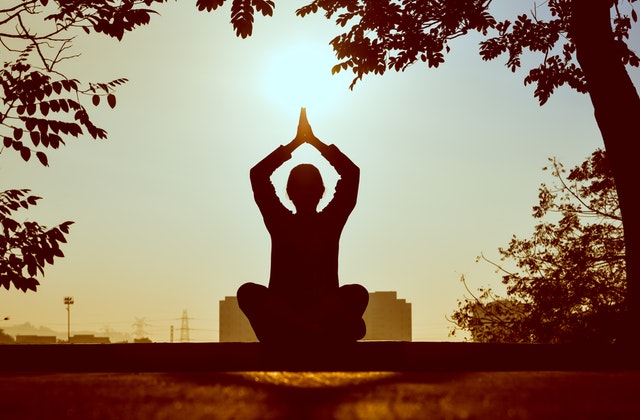Nowadays, meditation seems to be part of everyone’s morning routine, bedtime routine, and everything-in-between routine. Every wellness guru, Instagram yogi, busy CEO, and life coach is reminding us to cultivate mindfulness, slow down, and spend a few minutes in meditation each day. There are countless meditation apps that you can download, which will allow you to listen to strangers with soothing voices instruct you to breathe deeply, relax every muscle in your body, and let all the stresses and worries of your day melt away. Sink into your pillow, visualize yourself on the beach at sunset, forget all about that weird passive-aggressive comment from your coworker, and simply be.
I’ve been meditating on and off for a few years now—for a while, I was mostly “off,” but since the beginning of 2018, I’ve actually managed to make it a consistent habit. When I began meditating occasionally back in the spring of 2015, I struggled with beginner’s boredom—as every first-time mediator probably knows, sitting in silence and doing nothing for even five minutes can feel more uncomfortably dull than enlightening. But eventually, I began to enjoy my little mindfulness sessions, even though I always had to cheat a bit and rest my back against a pillow to keep my achey shoulders from distracting me.

I fell out of practice for some time, but one night when I happened to be up late without anything to do, I figured I would give it another go. I set up my pillows, closed my eyes, and began breathing deeply. Unsurprisingly, I felt a little strange—I imagined that it would just take some getting used to again. But the next night, I tried again, and the session didn’t go as expected.
Just like the previous night, I sat cross-legged and set a timer for five minutes. But instead of feeling relaxed and peaceful, I found myself in tears before the timer even went off. When I had stepped away from all the distractions in my life, thoughts and emotions I had tried to put out of my mind came bubbling back up, and I had no idea how to process them.
Today, I can happily sit in meditation before having my morning coffee or at the end of a yoga class with no problem. I definitely feel like sticking to this habit has been positive overall. However, I couldn’t get that memory of my emotional meditation session out of my head, and I wondered if other people had ever had a negative experience with mindfulness. Interestingly enough, the research suggested that it was more common than we might think.
Some people may turn to meditation as a form of avoidance or escapism. Rather than actually working through negative emotions they might be feeling, they may try to use meditation as a way to just “let go” of those thoughts—which is probably why I found myself crying in lotus pose. Some meditative traditions also strongly emphasize the idea of detachment as a way to let go of suffering, but for people struggling with depression or other mental health issues, strong, reliable attachments with supportive people might actually be what they need more than anything. This focus on detachment can prompt some people to retreat further into their own inner worlds at a time when they need they would probably be better off looking outside of themselves for help.
And although mindfulness is often referred to as a practice that can alleviate anxiety, it can have different effects on different people. For some people with anxiety, meditation can actually make those anxious thoughts worse. Why would that happen? Well, when you sit back and “notice” your thoughts for the first time and start to figure out the roots of your anxiety, it can be jarring, and you might not know how to work through it without guidance.
Don’t get me wrong—I still believe that meditation is a valuable practice for the majority of people, and I genuinely think that the world would be a better place if we all spent a little more time meditating. But it’s important for people to understand that there can be downsides, especially for beginners who are drawn to the practice because they’re hoping it will help to improve their mental health.
If you’ve struggled with meditation in the past because it provokes an intense emotional response, or you’re interested, but you don’t want to risk dredging up emotions that you’re not ready to deal with on your own, there’s never any shame in seeking out a therapist or counselor who can help you. Mindfulness is a beautiful thing, but you don’t have to dive in headfirst all on your own.
Also by Jane: Don’t Let Holiday Debt Ruin Your Joy. How To Set Boundaries Around Spending This Season
Why Body Neutrality Might Be Better Than Body Positivity
Get more like this—Subscribe to our daily inspirational newsletter for exclusive content!
__
Photo: Pexels




